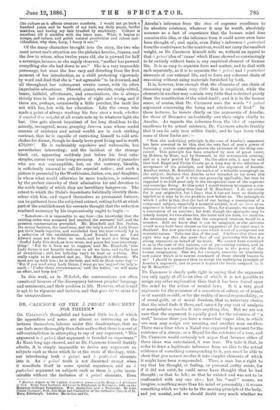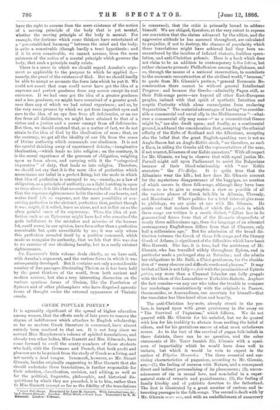DR. CAZENOVE ON THE .1 PRIORI ARGUMENT FOR THEISM.'
DR. CAZENOVE'S thoughtful and learned little book, of which the appendices and notes are almost as interesting as the lectures themselves, labours under this disadvantage, that no one feels more thoroughly than their author that there is a sort of self-contradiction in attempting to say of any argument, "This argument is a priori, that argument is founded on experience." As Kant long ago showed, and as Dr. Cazenove himself frankly admits, it is simply impossible to devise any argument on subjects such as those which lie at the roots of theology, with- out introducing both a priori and it posteriori elements into it. An a priori truth is not discerned except when it manifests itself in some special experience, and an a posteriori argument on subjects such as these is quite incon- ceivable without the inclusion of a priori elements. Even • Historic Aspects of the priori Argumntt concerning thc Being and Alt ributes of God. Being Four Lectures delivered in Edinburgh in November, lest, on the Honyman-Billespie Foundation. With Appendices and a Postssript. By John Gibson Cazenove, D.D., Sub-Dean and Chancellor of the Cathedra'. Church of St. Mary, Edinburgh. London : Macmillan and Co. Ansehn's inference from the idea of supreme excellence to- its absolute existence, whatever it may be worth, absolutely assumes as a fact of experience that the human mind does conceive this idea, or the inference from it could never even have been thought of; and again, even Paley's inference a posteriori from the contrivance to the contriver, would not carry the smallest weight, as Dr. Cazenove himself tells us, without an appeal to that a priori idea of cause' which Hume showed so convincingly to be entirely without basis in any empirical element of human life. It is as easy to separate form and matter, and to deal with each separately, as it is to separate the a priori and a posteriori elements of our rational life, and to form any coherent chain of reasoning without using materials furnished by both.
It is, however, true enough that the elements of one chain of reasoning may contain very little that is empirical, while the elements in another may contain very little that is derived purely from the constitution of the mind itself; and it is in the former
sense, of course, that Dr. Cazenove uses the words "a priori argument concerning the being and attributes of God." In
these lectures, he insists chiefly on the arguments of Anselm, for those of Descartes unioubtedly owe their origin chiefly to Anselm. As regards the inference from the idea of supreme excellence to its actual existence, Dr. Cazeuove admits frankly that it can be only true within limits, and he lays down what some of these limits are :—
"Now the underlying principle in the case of Anselin's argument has been asserted to be this, that the very fact of men's power of forming a certain conception proves the existence of the thing con- ceived. This principle has been attacked by men of great name, by Hobbes, by Hoot, aid by Gassendi, in the seventeenth century, and at a later period by Kant. On the other side, it may be said that both Hegel and Victor Cousin go a long way in the direction of acceptance of the principle, and defend the argument of Anselm. Another writer, M. Bouchitte, the author of a valuable monograph on the subject, declares that Anselm never intended to lay down this principle broadly, as if it were one generally apiilicable, but that he supposed it to bold good only in the exceptional case of the supreme and sovereign Being. At this point I would venture to suggest a con- sideration less sweeping than that of M. Bouchitte. I do not claim for it any originality, but I fancy that it has not been so distinctly applied as it may be to the problem now before us. The principle to which I refer is this, that the fact of our having a conception of a compound subject, especially a material subject, is of no force as an argument in favour of its existence. Thus, for example, we can form a conception of an unicorn ; but here, though the aggregate may be utterly unreal, its two elements, the horse and the horn, are realities. An anatomist may tell me that the compound creature would be a monster. Still we know that it can be imagined, or else unicorns would never have been chosen as the supporters of the royal arms in Scotland. But now proceed to a case which is not of a compound nor material nature. Take our idea of the soul. I believe that those are right who say that the were fact of our possessing this idea is a strong argument on behalf of its truth. We cannot have combined it, as in the case of the unicorn, cut of pre-existing notions, and in truth there is a marked limit in this direction to the power of the human imagination. Can we, for example, conceive an absolutely new colonr which is in nowise combined of those already known to us ? I should be prepared then to accept the underlying principle of Anselm's argument, and to press it beyond the limits assigned to it by M. Bouchitte."
Dr. Cazenove is clearly quite right in saying that the argument can only apply at all to an idea of which it is not possible to assign any other explanation than that it has been forced upon the mind by the action of mental laws. It is a very good argument for the existence of a sensation of colour, or of sound, or of warmth or cold, or for the reality of moral responsibility, or of moral guilt, or of moral freedom, that is, voluntary choice, that the mind finds it there, and cannot by any sort of analysis or manipulation resolve it into anything else. But we are not sure that the argument is equally good for the existence of "a soul," because there you have a somewhat vague idea, to which one man may assign one meaning, and another man another. There was a time when a Naiad was supposed to account for the existence of a stream, or a Dryad for the existence of a tree, and Dr. Cazenove would certainly not argue that because either of these ideas was entertained, it was true. We take it that, in order to draw a legitimate inference from an idea to the actual existence of something corresponding to it, you must be able to show that you cannot resolve it into simpler elements of which it might have been compounded. Thus, a man has a right to say that his thought, or feeling, or personal entity exists, for if it did not exist, he could never have thought that he had thought ; or that he felt ; or that he existed and was not to be confounded with any one else ; but his " soul " means, we imagine, something more than his mind or personality ; it means something which we take to be the moving principle of the body, and yet mental, and we should doubt very much whether we
have the right to assume from the mere existence of the notion of a moving principle of the body that is yet mental, whether the moving principle of the body is mental. For example, the doctrine which some thinkers have entertained of a " pre-established harmony" between the mind and the body, is quite a conceivable (though hardly a true) hypothesis ; and if it be even conceivable, we cannot assume, from the mere existence of the notion of a mental principle which governs the body, that such a principle really exists.
There is a sense in which we should regard Anselm's argu- ment as applicable to the purpose to which he applied it,— namely, the proof of the existence of God. But we should hardly be able to accept as accurate the form into which he putit. We could not assert that man could never have got the idea of a supreme and perfect goodness from any source except its real existence. If we had once got the idea of a greater goodness and a less goodness, we might have conceived of a greater good- ness than any of which we had actual experience ; and so, by the very same process by which we get from imperfect eyes and ears to the idea of an eye free from all deficiencies, or an ear free from all deficiencies, we might have attained to that of a virtue and a justice and a power exempt from all deficiencies. But then, we should contend that, as a matter of fact, we do not attain to the idea of God by the idealisation of man ; that, on the contrary, we get all the ideality of our life from the sense of Divine authority which commands our obedience. It is not the careful thinking away of experienced defects,—imaginative idealisation,—which leads us into religion ; on the contrary, it is the moral experience of the pressure of obligation, weighing upon us from above, and carrying with it the "categorical imperative" of duty, that leads us into religion. Therefore, we should not say that it is the mere idea of perfection which necessitates our belief in a perfe,3t Being, but the mode in which that idea of perfection is conveyed to us,—namely, as a law of obligation, as a principle of authority, as a light bursting in upon us from above ; it is this that necessitates our belief. It is the fact that the supreme righteousness holds the reins of our hearts, and makes itself felt as supreme, not the mere possibility of con- ceiving perfection in the abstract, perfection that, perfect though it was, might, if it willed, leave us alone, and not inflict on us the often painful sense of its supremacy. Thus, the idea of per- fection such as an Epicurean might have had who conceived the gods indifferent to the mistakes and miseries of the human lot, could never, in our opinion, have been other than a perfection conceivable but quite unverifiable by us ; it was only where this perfection revealed itself by a positive command, which made us recognise its authority, that we felt that this was due to no exercise of our idealising faculty, but to a really existent righteousness.
Dr. Cazenove's little volume deals chiefly, as we have said, with Ansehn's argument, and the various forms in which it was subsequently developed. But it contains not only a considerable number of fine passages illustrating Theism as it has been held by the great thinkers of the world, from both ancient and modern sources, but also a very interesting discussion on the various spurious forms of Theism, like the Pantheism of Spinoza and of other philosophers who have disguised agnostic forms of thought under the external appearance of Theistic creeds.



































 Previous page
Previous page